- June 20, 2023
Do Cats Snore? 6 Vet-Reviewed Reasons
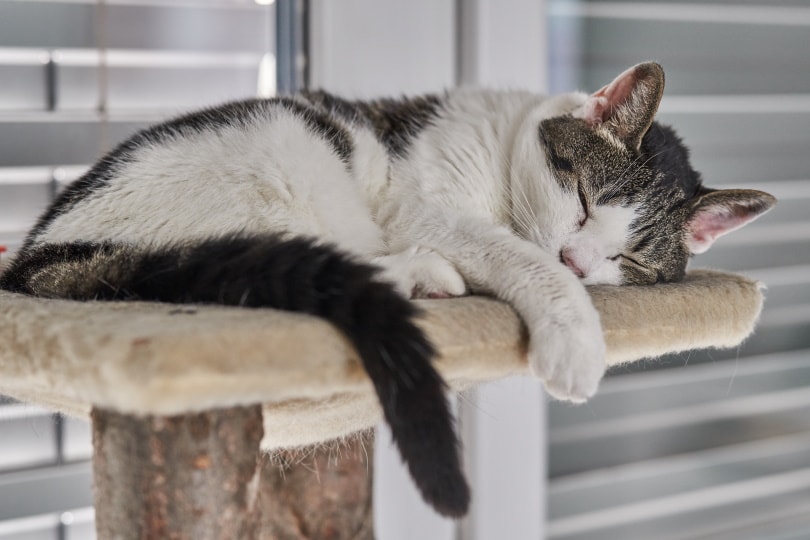
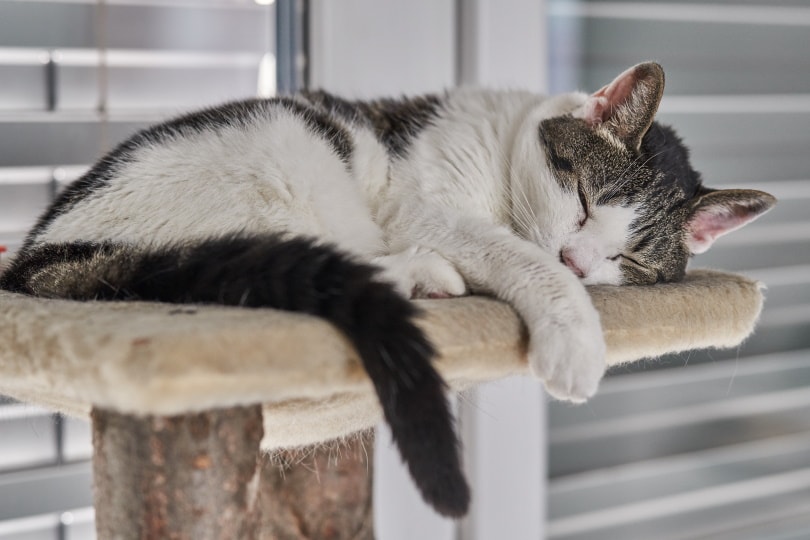

The information is current and up-to-date in accordance with the latest veterinarian research.
The old-fashioned concept of the graceful yet dignified cat has fallen away due to the discovery of how adorably goofy they can be. But the last thing that you’d expect is your still somewhat-dignified kitty to snore, especially when they’re so cutely curled up into a ball! So, do cats actually snore?
The short answer is yes, cats do snore. There are several reasons for it, most of which are nothing to worry about, but in some cases, it might be a cause for a veterinary visit.
So, if your cat has suddenly started snoring, and you’re wondering if you should be worried, keep reading, as we fill you in on snoring in cats and when you should seek help.
How Does Snoring Work?
The same thing that causes snoring in most humans is what causes snoring in cats. They have loose tissue located in the upper airway, at the back of the nasal passage, which enables air to enter when they breathe in and prevents water from entering the nose while drinking.
It’s this tissue that causes snoring when the upper airways—the nose, back of the mouth, and throat—vibrate when the cat is asleep. It occurs when the tissues are relaxed while sleeping, but there are several other causes for snoring. Not every human or cat snores, after all.
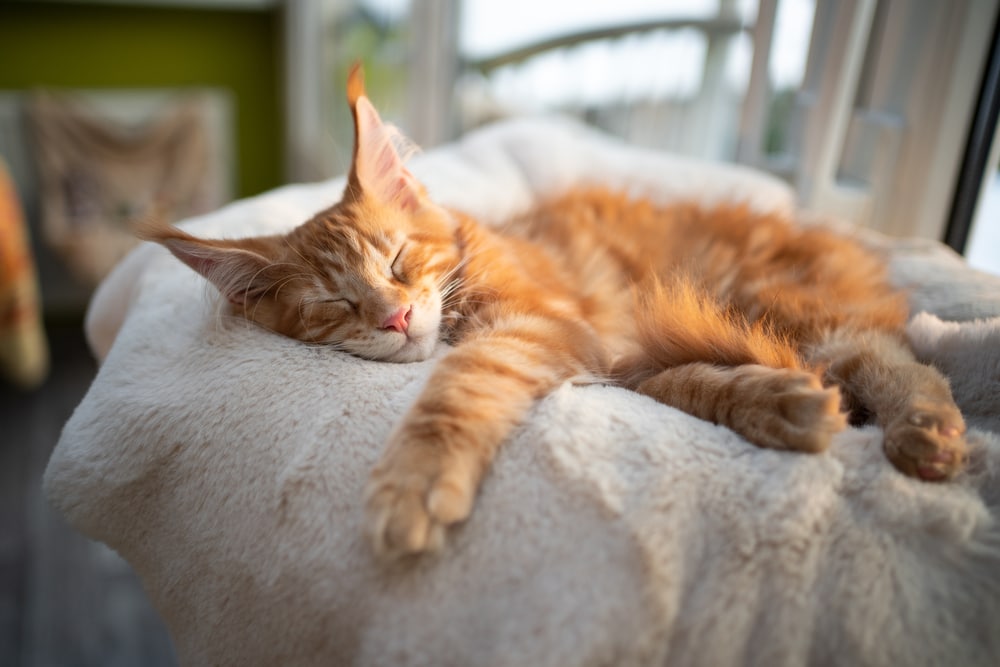
The 6 Causes of Snoring in Cats
There are many reasons that some cats snore, and here are the most common ones.
1. Brachycephalic Cats
Brachycephalic cats are breeds that typically have short (brachy) and broad heads (cephalic) with flat faces,1 including Himalayans, Persians, and Exotic Shorthairs. These cats can have problems with their airways, including breathing issues, because of their small nostrils, narrow windpipe, and elongated soft palate. All of this easily leads to snoring.
2. Senior Cats
As cats age, the soft palate starts to loosen and become more flaccid. This can lead to snoring, so if your cat has reached a certain age and has started snoring, as long as they seem healthy and aren’t struggling to breathe, it might just be part of the aging process.

3. Sleeping Position
Cats can get themselves into all kinds of contortionist positions while sleeping. Certain sleeping positions that your cat takes on might lead to a bit of snoring.
If the snoring stops when they change positions and doesn’t start up again, it’s just a case of temporary snoring.
4. Overweight Cats
Obese cats are more likely to snore because of the extra fat surrounding the tissues in the upper airways.
The snoring itself isn’t a problem in these cases, but overweight cats are more likely to develop other health conditions, such as pancreatitis and diabetes. You should speak to your vet about helping your cat with weight loss.
5. Foreign Object
In some cats, a foreign object might be partially blocking the upper airways—perhaps a blade of grass or a seed. You’ll likely also see your cat coughing and acting agitated.
It might also be something like a dental abscess, a polyp, or a tumor. If your cat is not only snoring but also acting like they are uncomfortable, speak to your vet.
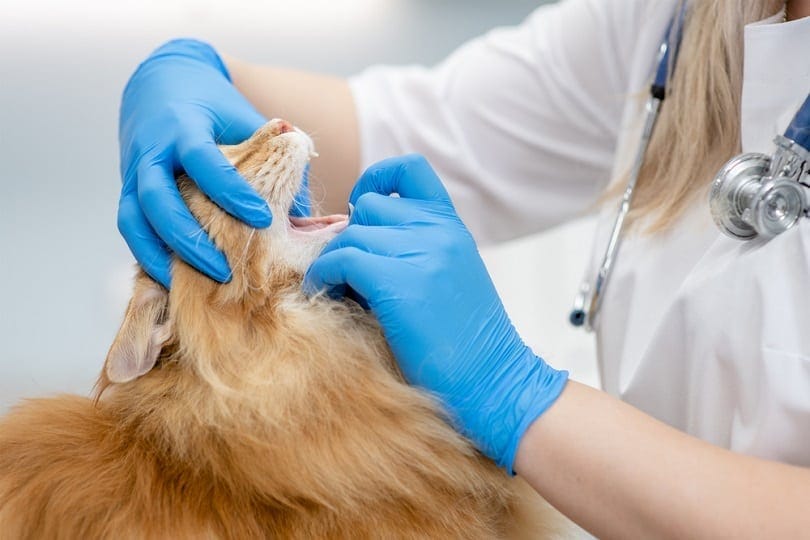
6. Respiratory Problem
If a cat’s nose is stuffy, they might have a respiratory infection, which can lead to snoring. Other signs of a respiratory infection are discharge from the nose and eyes, coughing, sneezing, decreased appetite, and lethargy.
It could also be asthma, allergies, or chronic rhinitis (nasal inflammation). Essentially, any health condition that makes your cat’s nose stuffed up will likely lead to snoring.
When Should You Take Your Cat to Your Vet?
If you’re concerned because your cat has suddenly started snoring, you should speak to your vet to determine if there’s an issue. That said, many instances can lead to snoring that are perfectly normal. But if the snoring is accompanied by changes in your cat’s behavior or they are struggling to breathe, take them to the clinic immediately.
Signs that you should take seriously are:
- Open mouth breathing
- Panting
- Wheezing
- Coughing
- Nasal discharge
- Swollen face
- Change in vocalizations
- Change in appetite
If your cat sounds like they are snoring while they are awake, this is not snoring but a medical issue that needs veterinary help. If the snoring sound seems to come and go, record your cat and show the video to your vet. You can also take notes every time your cat makes the sound, along with what they were doing at the time and anything else particularly noteworthy.

How to Prevent Snoring
If your cat is snoring because of how they’re sleeping or because they are elderly, as long as they seem healthy, there isn’t much that you can do about it. Still, there are a few steps that you can take if the snoring is a problem.
If Your Cat Is Overweight
Toys
You will need to engage your cat in exercise. This means more playtime, so invest in feather wands or fishing line lures, and get them moving!
You can also get toys that your cat can play with on their own, such as kicker toys that enable them to bunny kick to their heart’s delight! Get cat-safe springs and catnip toys, as these will get your cat excited and ready for running and pouncing!
Climbing
If you don’t have any cat-specific climbing apparatuses like cat trees, you’ll need to invest in one or more. Cats love sitting and sleeping in high places, and there’s the added advantage of scratching opportunities. More climbing also means more exercise.
Be sure to check out window perches and cat shelves too. Some cat owners place various shelves, cat trees, and bridges around the top portion of their home’s walls, so their cats can walk around the entire room up high without touching the ground!
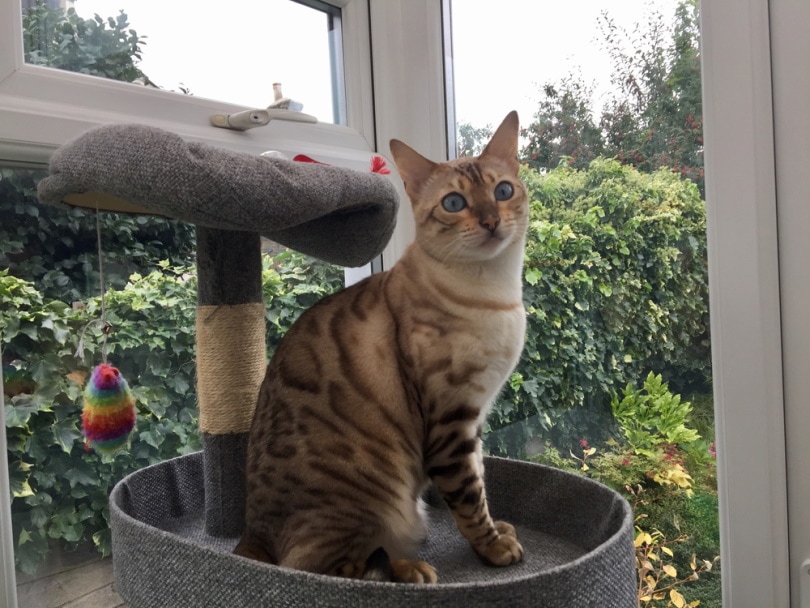
Food Puzzles
If your cat tends to wolf down their food, you might want to look into food puzzles and treat dispensers. These are designed to affect how fast a cat eats, which can also help those cats that might be eating out of boredom.
Food dispensers will spill out food as your cat plays and interacts with it. These give your cat the opportunity to “hunt” their food.
Veterinary Help
If your cat has weight issues, your vet should be a part of the process of helping them get to a healthier weight. This will likely include a change to their cat food to help facilitate weight loss.
One method, other than a change in dry food, is to increase the amount of wet food that your cat gets. Wet food can support weight loss because it is lower in carbohydrates than dry food and has a higher moisture content, which can keep your cat hydrated.
Your vet can help you switch your cat to a new diet and give you additional ideas to help your cat lose excess weight.

If Your House Has Dry Air
Consider investing in a humidifier and placing it in the same vicinity as your cat’s sleeping area. When your home has very dry air, it can dry out the airways, which might be part of the reason that your cat is snoring. Adding extra moisture to the air might help your cat sleep better and fix the snoring issue.
Conclusion
Snoring isn’t always an indication that something is wrong with your cat, but it’s good to be aware of the potential problems that might be leading to the snoring.
If you own a flat-faced cat or if they are overweight or a senior, snoring is likely par for the course, especially if they seem healthy, playful, and generally happy otherwise. That said, seek your vet’s help if there’s been a change in your cat’s behavior or in the way that they breathe.
For many cats, snoring is likely just one of their many endearing quirks.
Featured Image Credit: Piqsels
Tags
What do you think?
Related Articles

New Puppy Checklist: Gear You’ll Need for Your New Dog
Getting a new puppy is really exciting, but before you welcome them home, it’s important to prepare your space for them. Since puppies need a

How Big Do Mini Poodles Get? Vet Reviewed Average Weight & Growth Chart – Dogster
The information is current and up-to-date in accordance with the latest veterinarian research. Learn more » When you buy a Miniature Poodle, you might not

Can Police Dogs Smell Nicotine? Vet Verified Facts & Info – Dogster
The information is current and up-to-date in accordance with the latest veterinarian research. Learn more » While cigarette sales have been declining steadily for decades,

How Old Is 5 in Dog Years? Vet-Approved Guide to Each Size of Dog – Dogster
The information is current and up-to-date in accordance with the latest veterinarian research. Learn more » A common method for calculating a dog’s age is


